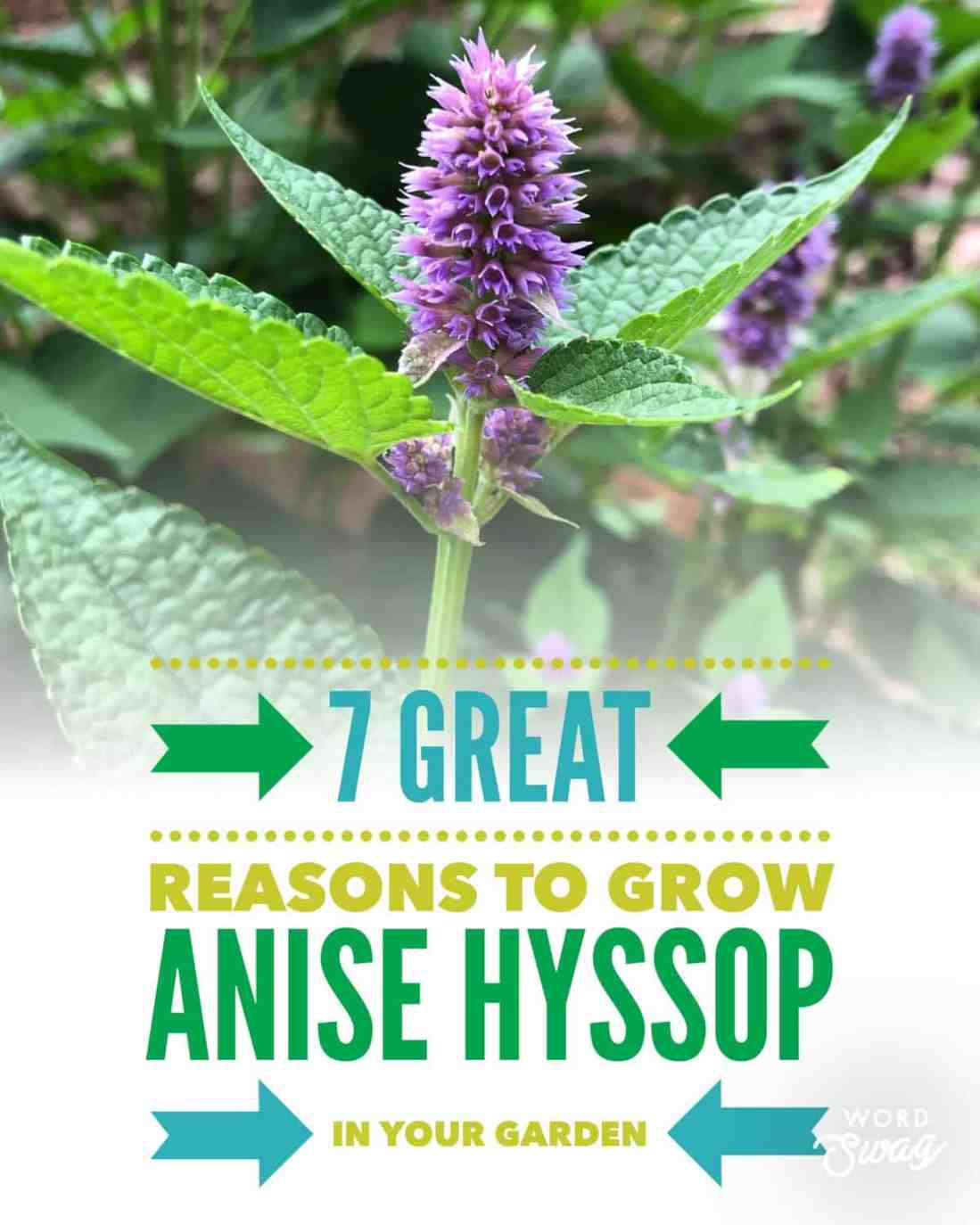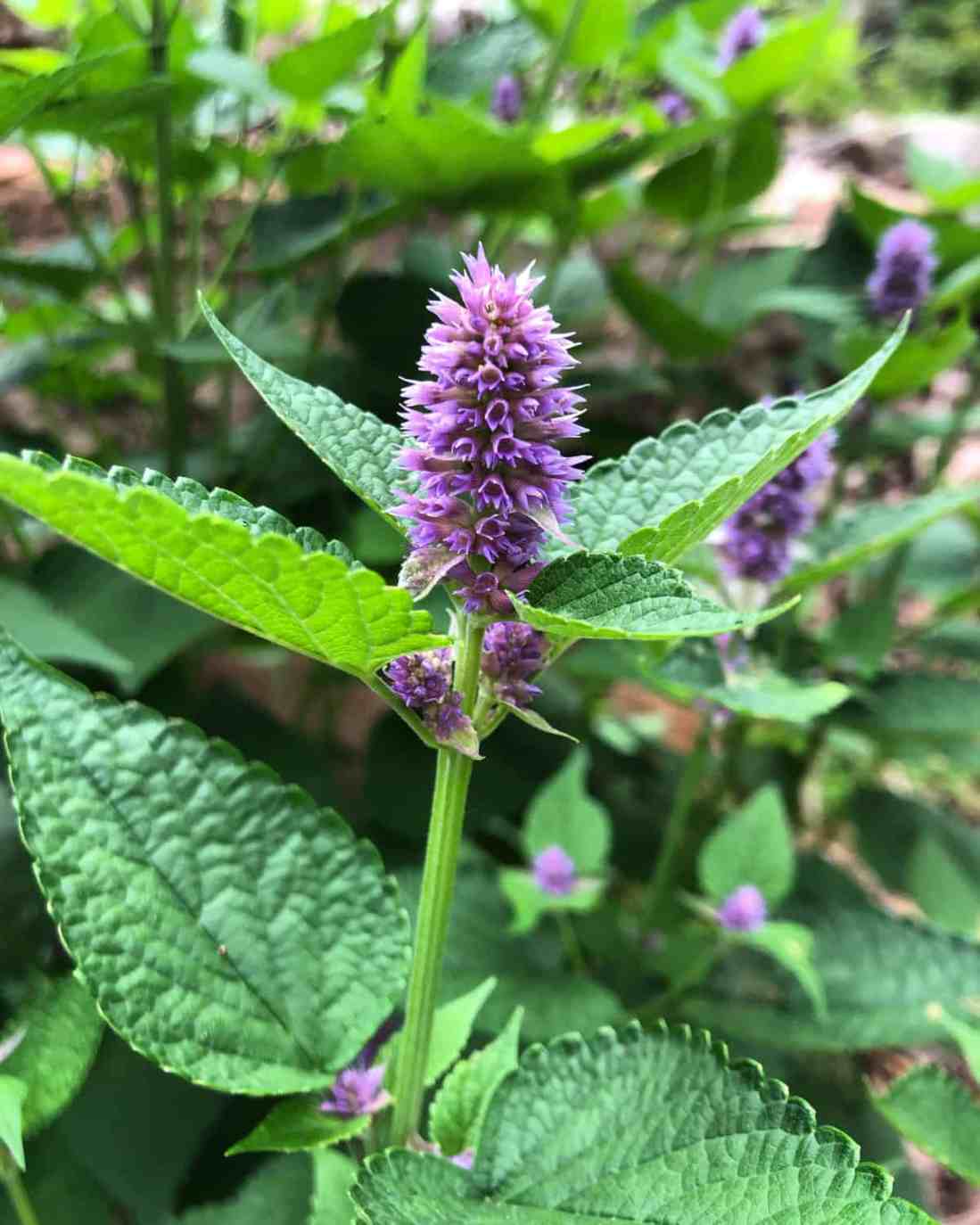7 Great Reasons to Grow Anise Hyssop in Your Herb Garden
Anise Hyssop was voted as the Herb of the Year, 2019, and for good reason. However, despite its brief moment in the spotlight, it still remains a not-so-well-known herb, so let’s change that!
7 Great Reasons to Grow Anise Hyssop in Your Herb Garden
- Color and Beauty
- Fragrance & Flavor
- Perennial Herb/Flower–Keeps coming back!
- Attracts Bees & other Pollinators
- Easy to Grow/Propagate
- Refreshing Tea
- Medicinal–Soothing, good for Respiratory System and more!
7 of My Favorite Reasons to Add Anise Hyssop Herb to Your Garden

The Color and Beauty
The bright, fuzzy spires of the Anise Hyssop flowers will bring you much enjoyment, especially if you love purple flowers, which I do! The leaves of the anise hyssop plant are pleasing to look at when not in bloom. They resemble other herbs within the mint family, having opposite, and medium-sized pointed leaves. The leaves are slightly fuzzy, and release a mildly licorice aroma when bruised.

2. Fragrance & Flavor
As mentioned, the fragrance of the anise hyssop reminds me of mint mixed with, well, anise! It’s a bit like the fragrance of a sweet fennel plant.
Leaves taste sweet with the anise flavor, and are not bitter like some other mints. We like to pick off a leaf and chew it when passing through the herb garden. It’s a great way to freshen your breath!
The anise hyssop makes a flavorful tea, alone, or mixed with other herbs.
3. Perennial Herb/Flower.
The anise hyssop plant just keeps coming back! Hardy in zones 4-9, it can withstand a pretty good freeze. Our current plant has weathered many winters in zone 6. We planted it a good 10-15 years ago, and have moved it around a couple of times. This past Winter, I found a couple of small seedlings that had sprouted after self-seeding, and I moved them to another spot, and now have a wonderful plant in my lower herb bed.
I recently did a tour through our herb garden, especially taking note of our anise hyssop herb. You can view that video Here or by clicking the image.
The flowers appear as early as May in some locations, and continue through the hotter months before fading to a grayish-lavender color. If left on the plant, the flowers may remain upright or the whole stem may lie over. Dried blooms provide seeds for birds during the Winter months or they will drop their seeds. The anise hyssop easily self-seeds, so before you know it, you may have a little patch!
I found this article, from Mother Earth Gardener, full of useful information and facts about the anise hyssop.
4. Attracts Bees & Pollinators
Much to my surprise this year, our anise hyssop plants turned out to be the TOP HANGOUT for bees! Every single time I passed by our plants, they were literally covered with bees! I learned recently that the blooms actually don’t have a fragrance, but somehow those bees can find them anyway!
The butterflies like them, and the hummingbirds actually love to visit the anise hyssop flowers. I also learned that the anise hyssop is sometimes called hummingbird mint.
The anise hyssop is a great plant to add to your pollinator garden! It looks fabulous next to Monarda, or Bee Balm, and Black-Eyed Susans and Coneflowers. I add it into my mixed herb/flower bed, and love the contrast between the fuzzy purple heads with our pink Knock-Out Roses. I have heard that there is no clashing in the plant world, and I believe that.

The Anise Hyssop also looks nice with other herbs, like chives, sage, and rosemary.
5. Easy to Grow/Propagate
You can grow the anise hyssop from seed fairly easily, or purchase live plants from reputable nurseries. We grew ours from seed many years ago, when Greg wanted to grow an edible landscape.
The seeds need light to germinate, and can stand freezing weather, so sprinkling them outside in the Fall works, or early Spring.
You can start your seeds indoors like with other herbs.
Once established, they readily self-seed, and you can propagate anise hyssop from stem or root cuttings or divide a plant.
One good thing about anise hyssop, compared to others in the mint family, is its growth habit. It does not take over or spread like crazy, and we know that other mints really can sprawl! Anise hyssop has a more upright growth habit, and doesn’t usually need staking.
6. Culinary Uses
So far, we’ve just used Anise Hyssop as a refreshing tea. Its mild mint-anise flavor is just the thing! On a hot day, it’s very nice iced, and sweetened with a pinch of Stevia. You may also drink it as a hot tea.
For more culinary uses of the anise hyssop, I found the following article useful in sparking some ideas.
Anise Hyssop Uses and Recipe Ideas, from Winnie, at Healthy Green Kitchen

7. Medicinal Benefits
The anise hyssop tea can help to soothe a sore throat, work to calm nerves, and is a good expectorant. This makes it a good herb to keep in your pantry for the cold and flu season. It can help to soothe coughing and bring relief to irritated mucous membranes of the respiratory tract.
Like another herb with a similar fragrance and flavor, fennel, the anise hyssop plant is beneficial for improving digestion and relieving gas.
This article, from HealthBenefits.com, lists many of the properties of the anise hyssop plant that you might find of use. I did.
There you have the 7 Great Reasons to plant Anise Hyssop!
I believe there are probably more reasons, but these are my favorites!
I hope that you have the chance to get ahold of some seeds or a plant, and grow some anise hyssop for yourself.
Sources & Links
You are not likely to run across anise hyssop plants at your local nursery. Maybe if it’s a specialty shop that has more obscure herbs.
We often purchase our seeds from Strictly Medicinals. They provide organic, high-quality seeds.
Seeds and plants from Strictly Medicinals
We also have bought many herb seeds from Richters.
Now, you can also find Non-GMO anise hyssop seeds at Amazon! Heirloom, Open-Pollinated, Non-GMO Anise Hyssop Seeds
Organic Anise Hyssop Live Plant
Let me know if you’ve seen the Anise Hyssop plant in your area for sale.
For Inspiration
This book, Edible Landscaping, has been a source for much pleasure and inspiration for us. It’s fun to browse for ideas and information on the various plants used in an edible landscape.
We also like The Edible Landscape: Creating a Beautiful and Bountiful Garden with Vegetables, Fruits and Flowers. You almost need several books to get a big picture approach if you’re looking for ideas.
We have many herb books. The Homesteader’s Herbal Companion covers so many aspects of what we need as homesteaders.
Our Herb Garden is constantly changing and growing. I’m delighted that Anise Hyssop has been a long-standing part of our herb bed for so many years! I look forward to enjoying this herb for many years to come!
Your Turn
Have you heard of the anise hyssop plant?
Do you currently grow it?
Have you tried tea made from the leaves? BOLO for my next post, on how to harvest anise hyssop for tea! For now, you can learn how to use another of our favorite herbs for tea, Stinging Nettle —Nature’s Antihistamine Herb
What do you use yours for?

Please join our blog family!
It’s free, and you’ll receive an email with new posts, so you won’t miss a thing!
Be sure to check out our social pages, where you’ll find other photos, snippets, and videos!
Keep growing and please stop to smell the flowers!
Laurie




I have to tell you that I have never heard of this herb. Thank you for bringing it to my attention and telling the benefits.
Thank you! It’s worth looking up, and now I have to take some to my mom! Sharing the blessings!
Another happy reader to learn from you about Anise.
Thank you for sharing your various links with us at #275 SSPS Linky. Hope to see you again next week.
That’s great to hear!